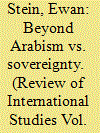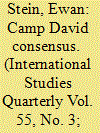| Srl | Item |
| 1 |
ID:
117205


|
|
|
|
|
| Publication |
2012.
|
| Summary/Abstract |
This article critiques constructivist approaches to the international relations of the Middle East and sets out an alternative interpretation of the role of ideas based on political economy and the sociology of knowledge. It cautions against using constructivism as a way of 'building bridges' between IR and Middle East Studies and disputes the claim that the norms of 'Arabism' as a putative regional identity are in contradiction with those of sovereignty. The article shows that this assumption is based on the combined influences of modernisation theory and Orientalist assumptions about the power and continuity of regional culture that have persisted in Middle East IR. This is despite the fact that there is no reason to believe the Arabs constitute a more 'natural' nation than do the Syrians, Iraqis or Egyptians. The political role and resonance of ideas can be better established by viewing the modern history of the Middle East in terms of domestic structure and social change, and in particular emphasising the role of rising middle classes in revolutionary nationalist movements. The findings of this article raise questions for the utility of 'moderate' constructivist interpretations of International Relations as a whole.
|
|
|
|
|
|
|
|
|
|
|
|
|
|
|
|
| 2 |
ID:
106930


|
|
|
|
|
| Publication |
2011.
|
| Summary/Abstract |
This paper explores the nature, background, and evolution of the "Camp David consensus." Under this consensus, Egyptian intellectuals and political movements broadly accept that the Egyptian regime must deal constructively and "correctly" with Israel as a state, but insist that society has the right and responsibility to resist Zionism. The consensus rests on particular ways of understanding Israel, and the nature of the Arab-Israeli conflict, that can be traced back to the formative years of the Egyptian republic under Nasser. This has served the interests of both regimes and opposition movements and in this sense represents a "double instrumentalization" of foreign policy. The paper, which examines a range of regime and intellectual pronouncements during the Nasser and Sadat periods, as well as more recently, challenges the growing use within International Relations, particularly in the Middle East context, of the concept of "identity" to explain state behavior.
|
|
|
|
|
|
|
|
|
|
|
|
|
|
|
|
| 3 |
ID:
153947


|
|
|
| 4 |
ID:
106654


|
|
|
|
|
| Publication |
2011.
|
| Summary/Abstract |
This study will examine the Jama'a Islamiyya (ji) as an example of a group that has, in different ways, tried to shape patterns of civility and position itself as an interface between state and society in Egypt. It charts and offers an explanation for the ji's intellectual and programmatic transition fromaspiring to create a totally new polity based on a Salafi Islamic form of civility to an accommodation with the state and apparently more tolerant posture vis-à-vis society. The study analyses the ji's shifting interpretation of hisba and argues that, although the ji appears reconciled to a more co-operative stance, the group continues to promote an unrealistic vision of state-society relations in Egypt. Whereas before the 'revisions' the ji proceeded from an idealised conception of the Islamic state and the potential for its realisation in Egypt, its new ideas suggest an equally naive conception of the existing state and its ability to regulate, and police, society. The political and intellectual trajectory of the ji tells us much about the role of societal groups in sustaining authoritarianism in Egypt and suggests that any compact between the ji and a regime like that of Mubarak is likely to remain 'uncivil'.
|
|
|
|
|
|
|
|
|
|
|
|
|
|
|
|